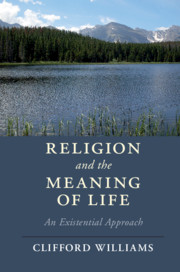Book contents
- Religion and the Meaning of Life
- Cambridge Studies in Religion, Philosophy, and Society
- Religion and the Meaning of Life
- Copyright page
- Contents
- Acknowledgments
- Introduction
- 1 Why Should We Care about Meaning?
- 2 Boredom
- 3 Denial of Death
- 4 Acquiring Meaning
- 5 Suicide
- 6 The Divine One
- 7 Life after Death
- 8 Obstacles
- 9 How Should We Live So as to Die Well?
- Epilogue Facts the Heart Can Feel
- Notes
- References
- Index
2 - Boredom
Published online by Cambridge University Press: 23 March 2020
- Religion and the Meaning of Life
- Cambridge Studies in Religion, Philosophy, and Society
- Religion and the Meaning of Life
- Copyright page
- Contents
- Acknowledgments
- Introduction
- 1 Why Should We Care about Meaning?
- 2 Boredom
- 3 Denial of Death
- 4 Acquiring Meaning
- 5 Suicide
- 6 The Divine One
- 7 Life after Death
- 8 Obstacles
- 9 How Should We Live So as to Die Well?
- Epilogue Facts the Heart Can Feel
- Notes
- References
- Index
Summary
Chapter 2 distinguishes everyday boredom from existential boredom. The former involves losing particular desires whereas the latter involves losing all desires - nothing interests one. The chapter describes the fright and terror that are often felt when existential boredom threatens. It also describes evasive tactics that are used to avoid that terror. Among these tactics are physical activities, mental activities, and moral and religious activities. Without these evasive tactics, one could experience dread, agony, despair, frustration, rebellion, or suicidal feelings. The myth of Sisyphus is used to illustrate rebellion. One can, however, deal with boredom in a different way by regarding it as what Soren Kierkegaard calls a “call from eternity.” The chapter describes five conditions that are needed for one to experience such a “call,” plus the differences between an activity that is used simply to evade boredom and one that alleviates boredom without doing so evasively.
Keywords
- Type
- Chapter
- Information
- Religion and the Meaning of LifeAn Existential Approach, pp. 30 - 41Publisher: Cambridge University PressPrint publication year: 2020

